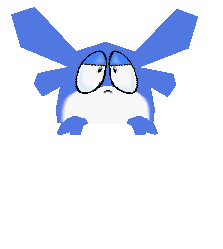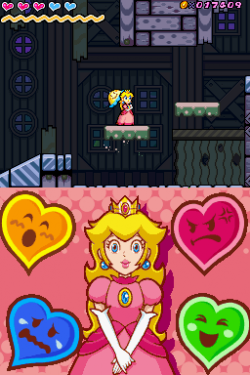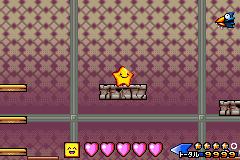Super Princess Peach: Difference between revisions
Torchickens (talk | contribs) mNo edit summary |
Torchickens (talk | contribs) No edit summary |
||
| Line 83: | Line 83: | ||
*In [[mariowiki:Gleaming Glacier|Gleaming Glacier]], the Starfish can be found standing on top of a slippery ledge. When approached by Peach, it will [[dash]] to the left in the same way as Starfy and Starly in ''The Legendary Starfy'' series. If Peach fails to defeat it, then it will escape by [[duck]]ing through a gap in the wall. | *In [[mariowiki:Gleaming Glacier|Gleaming Glacier]], the Starfish can be found standing on top of a slippery ledge. When approached by Peach, it will [[dash]] to the left in the same way as Starfy and Starly in ''The Legendary Starfy'' series. If Peach fails to defeat it, then it will escape by [[duck]]ing through a gap in the wall. | ||
===Shared Staff=== | |||
*[[TOSE]] employee Akio Imai and [[Nintendo]] employee Azusa Tajima are both directors of Super Princess Peach. Akio Imai is credited for the conception of ''[[Densetsu no Starfy]]''. Both Akio Imai and Azusa Tajima worked together as directors of ''[[Densetsu no Starfy 2]]'' and ''[[Densetsu no Starfy 3]]''. Azusa Tajima was also an assistant director of ''[[Densetsu no Starfy]]'', and the sole director of ''[[Densetsu no Starfy 4]]''. | |||
*TOSE employee Yasuhiro Minamimoto and Nintendo employee Hitoshi Yamagami are both producers of Super Princess Peach. Both Yasuhiro Miniamimoto and Hitoshi Yamagami are credited as directors of the original ''Densetsu no Starfy'', and they have since worked together as producers of all ''The Legendary Starfy'' series games. | |||
*TOSE employee Shin Kondo is credited as a global producer of Super Princess Peach. He has played a role in the production of the first three Starfy games, and as one of the producers of the original ''Densetsu no Starfy''. | |||
==Similarities in Gameplay== | ==Similarities in Gameplay== | ||
| Line 123: | Line 132: | ||
====Shop==== | |||
=== | |||
== | |||
Super Princess Peach has a Shop menu that allows Princess Peach to exchange coins for upgrades to her abilities, upgrades to Perry, music for the Music Room, and puzzle pieces for the Puzzle menu. The Shop is a similar system to the shops in previous ''The Legendary Starfy'' games and ''[[Densetsu no Starfy 4]]'' which allow the player to exchange [[Pearl]]s purchase costumes and music. In ''Densetsu no Starfy 4'', life upgrades and upgrades to [[Spill Points]] gauge can also be purchased from the shop. | Super Princess Peach has a Shop menu that allows Princess Peach to exchange coins for upgrades to her abilities, upgrades to Perry, music for the Music Room, and puzzle pieces for the Puzzle menu. The Shop is a similar system to the shops in previous ''The Legendary Starfy'' games and ''[[Densetsu no Starfy 4]]'' which allow the player to exchange [[Pearl]]s purchase costumes and music. In ''Densetsu no Starfy 4'', life upgrades and upgrades to [[Spill Points]] gauge can also be purchased from the shop. | ||
Revision as of 10:31, 24 July 2012
Super Princess Peach (Japanese: スーパープリンセスピーチ) is a Mario series Nintendo DS platformer game produced by TOSE and Nintendo that was released in Japan in October 2005. As is true with the majority of games developed by TOSE, TOSE are not directly accredited as developers in the game.
In 2006 the game was localized overseas for North America, Australasia and Europe with added support for the Nintendo DS Rumble Pak.
The game references The Legendary Starfy series, with the the inclusion of a 'Starfish' enemy resembling Starfy wearing sunglasses that has the glossary entry "a star-shaped foe rumored to be the prince of a kingdom?".
Shared between different The Legendary Starfy series games are various similarities in gameplay. There are a number of shared staff between Super Princess Peach and past The Legendary Starfy games, including Akio Imai and Azusa Tajima who are the directors of Densetsu no Starfy 2 and Densetsu no Starfy 3.
Gameplay
Super Princess Peach is the first official adventure game in the Mario series starring Princess Peach as the primary protagonist. Princess Peach sets off to rescue Mario and others with the help of a magical umbrella called Perry and her emotions (referred to as 'vibes'). Various enemies on Vibe Island are affected by different vibes.
As Princess Peach, the player can touch one of four heart panels corresponding to the vibes 'Rage', 'Gloom', 'Calm' and 'Joy' for special powers provided that there is enough charge in the Vibe Gauge. These powers are often required to advance through a level. The Vibe Gauge can be replenished by absorbing enemies into Perry and collecting blue crystals. At the end of every stage is a boss level requiring Princess Peach to perform one of her vibes. At the end of each boss battle, Perry recalls an important part of his history.
Plot
Super Princess Peach is set on the mysterious Vibe Island. Vibe Island is a place that is a not far from the Mushroom Kingdom and is said to hold "great power". Found on the island is an item known as the legendary Vibe Scepter that is the source of much power. Bowser heard about the island and built a summer villa there intending to find the Scepter and take control of its powers.
Some time later, Bowser was sitting in his villa while the elite Army Hammer Bro. arrived to tell Bowser 'they' [presumably Bowser's minions] had found the scepter. He exclaimed loudly that they would finally have revenge on Mario and "his annoying pals" but the Army Hammer Bro. had left the door open, so Bowser appears to ask a Goomba and a green Koopa Troopa to close the door. The player must then shut the door using the touch screen, and Bowser laughs about showing Mario and others "who's boss".
The Army Hammer Bro. then asks the Goomba to take the scepter into the Mushroom Kingdom and wave it into the air, believing that a Goomba will go unnoticed. He tracks through the Goomba with the 'Koopa Shellceiver', and the player must indicate when the Goomba arrives at Princess Peach's Castle using the microphone. Afterwards, the Army Hammer Bro. calls many Hammer Bros. to charge into the castle. Mario, Luigi and a Toad are successfully captured and imprisoned by the Hammer Bros. so the Army Hammer Bro. returns to Bowser's Villa to tell Bowser about this news, to the delight of Bowser.
Bowser remarks that the scepter is stronger than he thought and wonders about the true powers of the scepter. Shortly later, the Goomba returns to the villa and the Army Hammer Bro. asks the Goomba to come with him and bring the scepter. The Goomba waves the Scepter back and forth, revealing that it has the power of changing the emotions of others. The sceptre changes the vibes of Bowser and other minions present, making them feel angry, sad, joyous and calm.
At that moment, Princess Peach, Toadsworth and two Toads return from their walk and sense that something is wrong. Various Toads are running back and forth in horror after Bowser left a letter noting that he captured Mario. The two Toads and Toadsworth worry what to do, and Toadsworth asserts that it's 'up to us' to rescue Mario. Princess Peach then runs away from the castle to the dismay of Toadsworth, and Toadsworth orders the two Toads to calm the others down before someone gets injured.
Toadsworth runs back to Princess Peach and orders her to come back to the castle, suggesting that it's dangerous for her to move out alone. Princess Peach replies that she must save Mario this time. Toadsworth accepts this, but insists that she brings the magical umbrella, Perry with her. Toadsworth had recently found Perry at a shop and believes he will come in handy in Peach's adventure. Perry replies that he can help her with beating enemies and that he knows everything about the island.
References to The Legendary Starfy series
This section is a list of references to The Legendary Starfy series in Super Princess Peach.

Stored inside of the 'G3D' directory of the Japanese version of Super Princess Peach are various unused models relating to The Legendary Starfy series including field tests and 3D models of Starfy and Konk that are also found inside of Densetsu no Starfy 4. This directory is omitted from the US version of Super Princess Peach.
Starfish

The "Starfish" (Japanese: スターフィッシュ, Sutāfisshu) [1] is an enemy that has a small chance of appearing in one location in Hoo's Wood (Stage 2-5), Wavy Beach (Stage 5-5) and Gleam Glacier (Stage 6-4). Its Glossary description, "a star-shaped foe rumored to be the prince of a kingdom?" may be a reference to Starfy who is the prince of Pufftop.
Perry Blocks are placed nearby where it appears which describe it as a "very odd enemy" shaped like a '☆' that has been 'spotted all over'.
Its sprite closely resembles Starfy wearing sunglasses. This may be relevant to The Legendary Starfy series, where Starfy has a hobby of collecting sunglasses and is seen wearing sunglasses on a number of occasions, such as the post-game title screens of all five games.
In order to register "Starfish" in the glossary, Peach must attack it once in all three locations in order to defeat it. If Princess Peach fails to attack it, there is a chance of seeing it again in the same location. The player can't return to the same location more than once to register the Starfish, as the Starfish won't appear again once attacked in that area.
Behavior
The 'Starfish' acts in similar ways to Starfy from The Legendary Starfy series.
- In Hoo's Wood, the Starfish can be found swimming back and forth in the water. It uses an attack similar to Turbo Swim ability to fly up into the air. Peach must attack it while it is flying.
- In Wavy Beach, the Starfish can be found sleeping on a blue pillow. This behavior happens in The Legendary Starfy series when input for Starfy or Starly is left inactive for a short while. The sprite is similar to Starfy sleeping in Densetsu no Starfy 4, but with the omission of Mattel on the pillow.
- In Gleaming Glacier, the Starfish can be found standing on top of a slippery ledge. When approached by Peach, it will dash to the left in the same way as Starfy and Starly in The Legendary Starfy series. If Peach fails to defeat it, then it will escape by ducking through a gap in the wall.
- TOSE employee Akio Imai and Nintendo employee Azusa Tajima are both directors of Super Princess Peach. Akio Imai is credited for the conception of Densetsu no Starfy. Both Akio Imai and Azusa Tajima worked together as directors of Densetsu no Starfy 2 and Densetsu no Starfy 3. Azusa Tajima was also an assistant director of Densetsu no Starfy, and the sole director of Densetsu no Starfy 4.
- TOSE employee Yasuhiro Minamimoto and Nintendo employee Hitoshi Yamagami are both producers of Super Princess Peach. Both Yasuhiro Miniamimoto and Hitoshi Yamagami are credited as directors of the original Densetsu no Starfy, and they have since worked together as producers of all The Legendary Starfy series games.
- TOSE employee Shin Kondo is credited as a global producer of Super Princess Peach. He has played a role in the production of the first three Starfy games, and as one of the producers of the original Densetsu no Starfy.
Similarities in Gameplay
Super Princess Peach shares a number of gameplay elements that are similar to other The Legendary Starfy series games.
Fragile Platforms

Levels in Shriek Mansion, Fury Volcano and Bowser's Villa feature fragile platforms that require Princess Peach to walk slowly on them using the L or R buttons. Similar platforms are used in Misty Town in Densetsu no Starfy 3 that require Starfy and Starly to glide on to them and walk slowly to avoid breaking them.

Similar Menus
Some of the different menus in Super Princess Peach are similar to those featured in The Legendary Starfy series games.
Bonus
The Bonus (Japanese: おまけ[2], Omake) menu allows the player to watch Perry's Dreams or toggle to Endless Vibe option on and off. This menu shares its name with the Omake option in Densetsu no Starfy which allows the player to watch the different endings and credits, or listen to music in the Tone of Ocean after unlocking them.
Glossary
The Glossary (Japanese: ずかん, Zukan) is an index of enemies including bosses listing a number of descriptions about enemies that Princess Peach has defeated.
This menu is similar to the Zukan menu in other The Legendary Starfy series games, or the Trading Card menu in Densetsu no Starfy 3, which indexes and describes characters met by the player, as well as enemies and bosses defeated by Starfy and Starly. In The Legendary Starfy, the Zukan (localized as 'Toys') is different, and is a capsule toy system is used where the player must buy a capsule containing a random character enemy or boss for 5 pearls in order to add it to the Toys menu.
Minigame
Minigames (Japanese: ミニゲーム) is a menu that allows the player to select a number of playable minigames, similarly to Densetsu no Starfy, Densetsu no Starfy 2, Densetsu no Starfy 3 and The Legendary Starfy which all feature minigame menus.
Music Room
The Music Room (Japanese: おんがくしつ, Music History) is a menu that allows the player to listen a number of game tracks found in stages or purchased from the shop. Other The Legendary Starfy series games feature a similar menu called Tone of Ocean (Japanese: 海のねいろ), localized in The Legendary Starfy as the "Sea Jams". In Densetsu no Starfy and The Legendary Starfy all tracks are available once the menu is unlocked. In Densetsu no Starfy 2, Densetsu no Starfy 3 and Densetsu no Starfy 4 individual tracks can be purchased from the shop or found in stages similarly to Super Princess Peach.
Shop
Super Princess Peach has a Shop menu that allows Princess Peach to exchange coins for upgrades to her abilities, upgrades to Perry, music for the Music Room, and puzzle pieces for the Puzzle menu. The Shop is a similar system to the shops in previous The Legendary Starfy games and Densetsu no Starfy 4 which allow the player to exchange Pearls purchase costumes and music. In Densetsu no Starfy 4, life upgrades and upgrades to Spill Points gauge can also be purchased from the shop.
The Shop can be accessed at any time from a stage map with the 'R' button in a similar way to the shops in Densetsu no Starfy 2 and Densetsu no Starfy 3 which can be accessed from a stage map with the 'L' button.